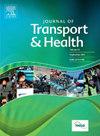Evaluating carbon footprint due to mobility choices and associated socio-demographic factors in the Kalyani region, West Bengal, India
IF 3.3
3区 工程技术
Q2 PUBLIC, ENVIRONMENTAL & OCCUPATIONAL HEALTH
引用次数: 0
Abstract
The present study examines the complex factors influencing carbon emissions in the Kalyani region, West Bengal. To achieve this, data were collected from 385 respondents. A general linear model was used to measure the influence of the predictor variables. The outcomes indicated that age, body mass index, distance, physical activity level, and mode of transport affect carbon footprint. A combination of active and passive transportation options is more environmentally friendly than relying on passive modes. Gender-specific differences in transportation choices emphasize the need to address gender-related barriers to sustainable transport. Education levels influence environmental awareness, with higher education associated with more sustainable mobility choices. Self-employed individuals and those with senior secondary education show lower emissions when using a combined approach of active and passive transport. A comprehensive strategy to address these multifaceted factors, with implications for policymakers and urban planners aiming to promote sustainability and eco-conscious transportation choices is needed.
评估印度西孟加拉邦Kalyani地区交通选择和相关社会人口因素造成的碳足迹
本研究考察了影响西孟加拉邦Kalyani地区碳排放的复杂因素。为此,从385名受访者那里收集了数据。采用一般线性模型来衡量预测变量的影响。结果表明,年龄、体重指数、距离、体力活动水平和交通方式影响碳足迹。主动和被动交通方式的结合比依赖被动交通方式更环保。交通选择方面的性别差异强调需要解决与可持续交通有关的性别障碍。教育水平影响环境意识,高等教育与更可持续的交通选择有关。自雇人士和受过高中教育的人士在使用主动和被动交通结合的方法时,排放量较低。需要制定一项综合战略,以解决这些多方面的因素,并对旨在促进可持续性和生态意识交通选择的政策制定者和城市规划者产生影响。
本文章由计算机程序翻译,如有差异,请以英文原文为准。
求助全文
约1分钟内获得全文
求助全文

 求助内容:
求助内容: 应助结果提醒方式:
应助结果提醒方式:


